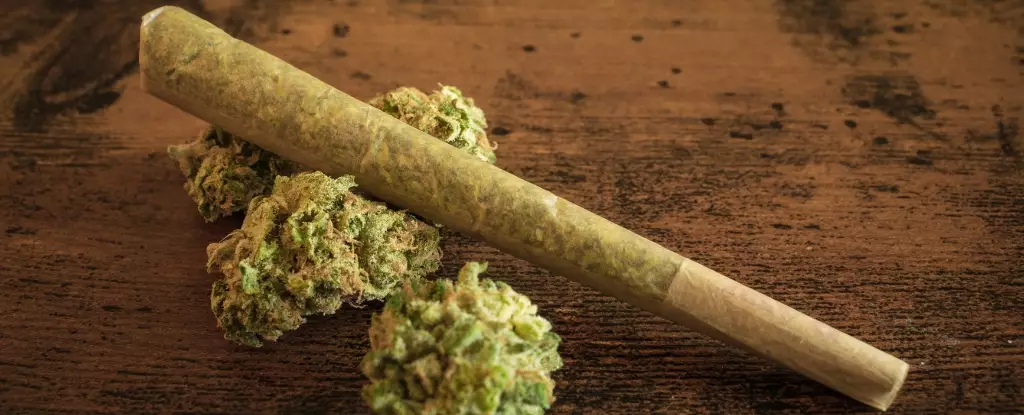While society often considers cannabis a relatively benign recreational substance, emerging research suggests its influence may run deeper than previously thought. Contrary to the common misconception that drugs like cannabis only produce transient effects, recent scientific findings reveal that cannabis use can leave a lasting imprint on our biological fabric—specifically within the epigenome. This isn’t about altering our core genetic code but about modifying how our genes are expressed, potentially influencing our health long after the effects of consumption have faded. In essence, cannabis may toggle certain genetic switches, dictating various physiological functions and susceptibilities that persist over time.
The study conducted by researchers at Northwestern University offers compelling evidence of these epigenetic modifications. Analyzing blood samples from over a thousand participants tracked for two decades, the scientists identified consistent links between marijuana use and specific DNA methylation patterns. Such methylation changes act like biological dials, turning genes on or off without changing the actual DNA sequence. These modifications could help explain observed associations between cannabis consumption and health conditions, opening a window into the subtle yet profound ways in which lifestyle choices influence our genetic legacy.
Epigenetics: The Biological Link Between Lifestyle and Health
Understanding epigenetics is crucial here. It’s a field that explores how external factors—like diet, stress, environmental toxins, and now, cannabis—shape gene activity. These changes are not static; they can evolve over time and even be inherited, passing epigenetic markers from one generation to the next. This means that the consequences of cannabis use could extend beyond individual health, potentially affecting future descendants.
The Northwestern study focused on DNA methylation—a process where methyl groups attach to specific DNA regions, influencing gene expression. Blood tests at two key time points (after 15 and 20 years) allowed researchers to compare methylation patterns with participants’ cannabis use histories. The results uncovered a spectrum of markers associated with both recent and long-term use, revealing a nuanced picture: not all use has the same epigenetic or health impact. Interestingly, some of the methylation changes observed were linked to processes like cellular growth, hormonal function, and neurological health—areas historically connected to mental health disorders like schizophrenia and bipolar disorder.
However, pinning these epigenetic modifications solely on cannabis use would be an oversimplification. The study stops short of asserting causality; instead, it paints a complex picture where cannabis might act as a catalyst, influencing biological pathways involved in disease risk. This raises important questions about dose, duration, and the role of individual susceptibility—variables that future research must clarify.
Shared Epigenetic Signatures with Tobacco: A Warning Signal
One particularly striking discovery was the identification of a methylation marker previously associated with tobacco use. This suggests that cannabis and tobacco may share overlapping pathways in the epigenetic realm, hinting at a broader pattern of substance-related gene regulation. Such findings challenge the often-held belief that cannabis, being ‘natural,’ is harmless; instead, they underscore the need to understand its biological footprint.
The potential health implications tied to these epigenetic changes are both intriguing and concerning. Given that some markers have links to neurological disorders, hormonal imbalances, and immune function, it’s plausible that heavy or prolonged cannabis use could subtly influence disease susceptibility. Whether these changes translate into tangible health outcomes remains an open question—one that demands rigorous, longitudinal investigation. Nevertheless, recognizing that our lifestyle choices can leave such lasting biological marks instills a sense of responsibility and caution, especially as cannabis continues to gain legal acceptance across various jurisdictions.
A Call to Rethink Cannabis Policies and Personal Choices
These revelations compel society to re-examine its stance on cannabis. Its legal status and cultural acceptance often overshadow the potential long-term biological effects. While the current data do not definitively prove causation, they do highlight that cannabis use is not a benign activity devoid of consequence. Instead, it can modify the very blueprint that governs gene activity, with possible repercussions on health and disease.
For policymakers, this information should serve as a prompt for more comprehensive regulation and public health messaging. Consumers, on the other hand, might want to consider the subtle biological footprints they leave behind with each use. As our understanding of epigenetics deepens, it becomes increasingly evident that personal health choices echo beyond the immediate experience, whispering into our genetic expression, potentially influencing wellbeing for years to come. Cannabis might be marketed as a recreational escape, but its biological effects could be akin to writing future chapters in our genetic story—a narrative that we have yet to fully understand.


Leave a Reply